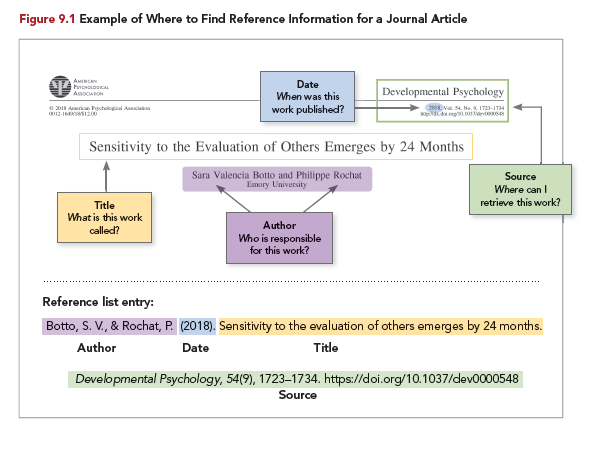Four Elements of a Reference
APA, 7th ed., bases its reference on the four elements. The four reference elements answer four questions:
Author - Who?
Date - When?
Title - What?
Source - Where?

https://apastyle.apa.org/style-grammar-guidelines/references/basic-principles
For further information, see pages 283-301 of the Publication manual of the American Psychological Association, 7th ed., 2020.
Author Types - Who?
| Type of Author | Format |
|---|---|
| One author | Author, A. A. |
| Two authors | Author, A. A., & Author, B. B. |
| 3-20 authors | Author, A. A., Author, B. B., & Author, C. C. |
| 21 or more authors | Author, A. A., Author, B. B., Author, C. C., Author, D. D., Author, E. E., Author, F. F., Author, G. G., Author, H. H., Author, I. I., Author, J. J., Author, K. K., Author, L. L., Author, M. M., Author, N. N., Author, O. O., Author, P. P., Author, Q. Q., Author, R. R., Author, S. S.,...Author, W. W. |
| Editor | Editor, E. E. (Ed.). |
| Two editors | Editor, E. E., & Editor, F. F. (Eds.). |
| Group author | Name of Group. |
Who is responsible for the work?
Use one space between author initials.
Hyphenated names. For given names retain the hyphen and include a period but no space (e.g. Mary-Jane Smith becomes Smith, M.-J.) unless the second element of the name is lowercase in which case you treat it as a single name (e.g. Ella-ann Fonseca becomes Fonseca, E.). For surnames write the name as it appears in the published work retaining the hyphen for hyphenated surnames (double-barrelled) or the space for two-part surnames (e.g. Louis-Dreyfus, J. or Lloyd Webber, A.).
If the author and the publisher are the same, omit the publisher.
If the author can not be determined, move the title of the work to the author position.
For further information on authors, refer to Publication manual of the American Psychological Association, 7th ed., 2020, pp. 286-289.
Date Types - When?
Books - Use the copyright date given on the book's copyright page.
Webpages - Make sure the date applies to the webpage you are citing. Copyright dates from website footers may not indicate when the content was published. Use the 'last updated' date if that is relevant to the webpage you are citing.
The date may take one of the following forms depending on the type of item being cited.
- year only
- year, month, and day
- year and month
- range of dates
While most references use only the year of publication, works published more frequently such as newspapers, include the year, month and day. For these types of works, put the year first in the following format.
(2020, December 15)
(2020, Summer)
When the publication date is unknown, use (n.d.).
For sources where the content changes frequently, provide a retrieval date.
Retrieved August 22, 2020, from https://xxxx
For further information on authors, refer to Publication manual of the American Psychological Association, 7th ed., 2020, pp. 289-291).
Title Types - What?
For works that stand alone such as books, italicize the title. Use sentence case -Capitalize the first word of the title and subtitle and proper nouns.
Rodl, S. (2018). Self-consciousness and objectivity: An introduction to absolute idealism. Harvard University Press.
For works that are part of a greater whole such as articles in journals or edited book chapters, do not italicize the title.
Goor, J., Sools, A. M., Westerhof, G. J., & Bohlmeijer, E. T. (2020). Wonderful life: Exploring wonder in meaningful moments. Journal of Humanistic Psychology, 60(2), 147-167. https://doi.org/10.1177/0022167817696837
Use bracketed descriptions to help identify works other than books, articles, reports etc. Provide a description of the work in square brackets after the title and before the period.
Russell Brand's definition of God [Video].
For further information on authors, refer to Publication manual of the American Psychological Association, 7th ed., 2020, pp. 291-293).
Source Types - Where?
Periodicals (e.g. journals, magazines, newspapers, newsletters, blogs etc.)
e.g. Periodical, Volume(issue), page or a range of page
Edited book with chapters or a reference book such as an encyclopedia
Author, A. A. (Year of publication). Title of chapter. In A. A. Editor (Ed.), Title of book (pp. chapter page numbers). Name of Publisher.
Publishers
e.g. Routlege
- Do not include Inc., Ltd., or LLC in the publisher name
- If the work is published by an imprint or division, use the imprint or division as the publisher.
- If the author and the publisher are the same, omit the publisher from the reference.
Social Media
e.g. Facebook. URL
Webpages or websites
Website name. URL or Retrieved Month Day, Year, from URL
Conferences
Conference Name, Location. DOI or URL
Databases
Do not include the database name for most research databases. Provide database or online archive information in a reference only when it is necessary for readers to retrieve the cited work from that exact database or archive...URLs from database or library-provided services usually require a login and/or are session specific, meaning they will not be accessible to most readers and are not suitable to include in a reference list." (Publication manual of the American Psychological Association, 7th ed., 2020, p. 317)
DOI
e.g. https://doi.org/10/1061/j.jebo.2019.03.023
URL
https://xxx or Retrieved Month Day, Year, from https://xxxx
The retrieval date is only required for online resources that change their content frequently.
For further information on authors, refer to Publication manual of the American Psychological Association, 7th ed., 2020, pp. 293-301).